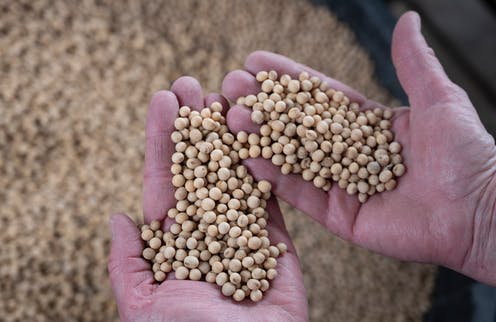China’s latest retaliation to U.S. tariffs is intensifying a shift away from American agricultural imports, especially soybeans, with Brazil emerging as the primary beneficiary. On Friday, Beijing imposed additional 34% duties on all U.S. goods, on top of 10-15% tariffs introduced in March on $21 billion worth of agricultural products.
Analysts say the new levies make U.S. farm imports “non-viable,” with traders expecting China to increase reliance on Brazil, Argentina, and Paraguay for soybeans, and Australia and Argentina for wheat. Jack Scoville of Price Futures Group warned that rising tariffs could cost the U.S. valuable export markets. "We’re pissing off everybody," he said, citing the broad reach of U.S. trade barriers.
The most-active soybean futures on the Chicago Board of Trade (CBOT) dropped 3.4% to $9.77 per bushel—its lowest level on a 2025 continuous chart. European traders predict the EU will impose its own soybean tariffs, further squeezing U.S. exporters.
Brazil is set for a record soybean export surge to China, aided by a strong harvest and rising port premiums, which spiked to $1 per bushel above Chicago prices after the tariff news. Carlos Mera of Rabobank noted Brazil’s growing role, while Sol Arcidiacono of HedgePoint said the geopolitical tension could spur expanded soybean cultivation in South America.
Meanwhile, China also canceled import approvals for sorghum from U.S.-owned C&D Inc. and poultry products from Mountaire Farms and other suppliers, citing food safety concerns.
China remains the largest buyer of U.S. farm goods, but imports have declined for two straight years, from $42.8 billion in 2022 to $29.25 billion in 2024, a trend likely to continue as the trade war escalates.



 Trump Allows Commercial Fishing in Protected New England Waters
Trump Allows Commercial Fishing in Protected New England Waters  Newly Released DOJ Epstein Files Expose High-Profile Connections Across Politics and Business
Newly Released DOJ Epstein Files Expose High-Profile Connections Across Politics and Business  Russian Stocks End Mixed as MOEX Index Closes Flat Amid Commodity Strength
Russian Stocks End Mixed as MOEX Index Closes Flat Amid Commodity Strength  Australia’s December Trade Surplus Expands but Falls Short of Expectations
Australia’s December Trade Surplus Expands but Falls Short of Expectations  Vietnam’s Trade Surplus With US Jumps as Exports Surge and China Imports Hit Record
Vietnam’s Trade Surplus With US Jumps as Exports Surge and China Imports Hit Record  Trump Endorses Japan’s Sanae Takaichi Ahead of Crucial Election Amid Market and China Tensions
Trump Endorses Japan’s Sanae Takaichi Ahead of Crucial Election Amid Market and China Tensions  Marco Rubio Steps Down as Acting U.S. Archivist Amid Federal Law Limits
Marco Rubio Steps Down as Acting U.S. Archivist Amid Federal Law Limits  RBI Holds Repo Rate at 5.25% as India’s Growth Outlook Strengthens After U.S. Trade Deal
RBI Holds Repo Rate at 5.25% as India’s Growth Outlook Strengthens After U.S. Trade Deal  New York Legalizes Medical Aid in Dying for Terminally Ill Patients
New York Legalizes Medical Aid in Dying for Terminally Ill Patients  Trump Signs “America First Arms Transfer Strategy” to Prioritize U.S. Weapons Sales
Trump Signs “America First Arms Transfer Strategy” to Prioritize U.S. Weapons Sales  Federal Judge Restores Funding for Gateway Rail Tunnel Project
Federal Judge Restores Funding for Gateway Rail Tunnel Project  Fed Governor Lisa Cook Warns Inflation Risks Remain as Rates Stay Steady
Fed Governor Lisa Cook Warns Inflation Risks Remain as Rates Stay Steady  TrumpRx Website Launches to Offer Discounted Prescription Drugs for Cash-Paying Americans
TrumpRx Website Launches to Offer Discounted Prescription Drugs for Cash-Paying Americans  U.S. Lawmakers to Review Unredacted Jeffrey Epstein DOJ Files Starting Monday
U.S. Lawmakers to Review Unredacted Jeffrey Epstein DOJ Files Starting Monday  Thailand Inflation Remains Negative for 10th Straight Month in January
Thailand Inflation Remains Negative for 10th Straight Month in January  Singapore Budget 2026 Set for Fiscal Prudence as Growth Remains Resilient
Singapore Budget 2026 Set for Fiscal Prudence as Growth Remains Resilient  Trump Rejects Putin’s New START Extension Offer, Raising Fears of a New Nuclear Arms Race
Trump Rejects Putin’s New START Extension Offer, Raising Fears of a New Nuclear Arms Race 































